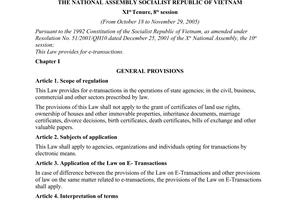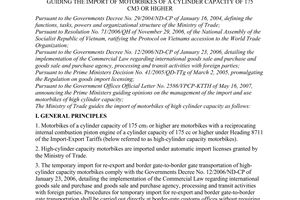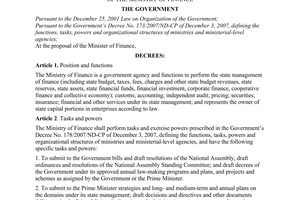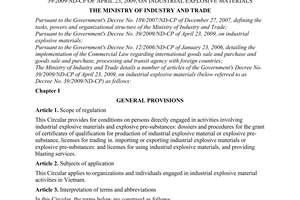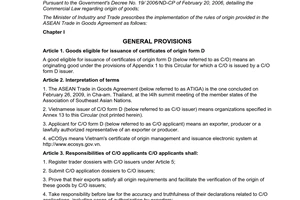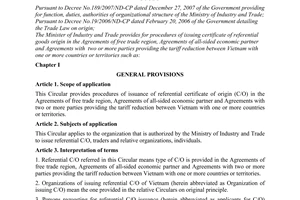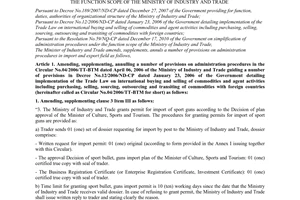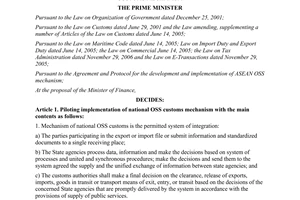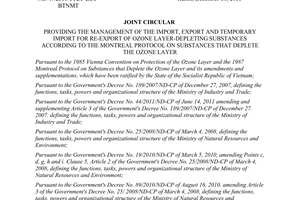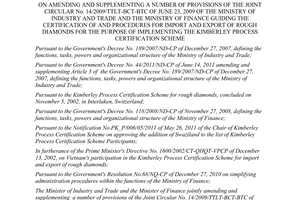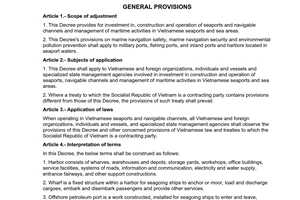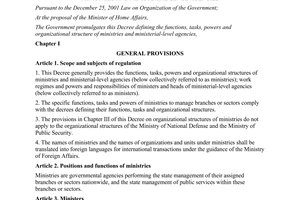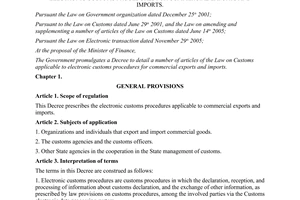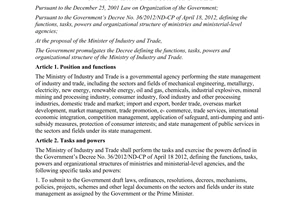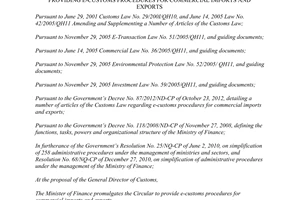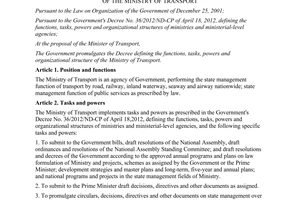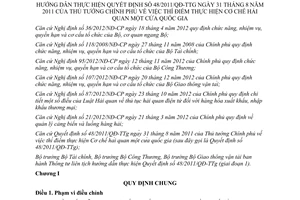Nội dung toàn văn Joint circular No.84/2013/TTLT-BTC-BCT-BGTVT guiding Decision No.48/2011/QD-TTg
|
MINISTRY
OF FINANCE - MINISTRY OF INDUSTRY AND TRADE - MINISTRY OF TRANSPORT |
SOCIALIST
REPUBLIC OF VIETNAM |
|
Hanoi, June 25, 2013 |
JOINT CIRCULAR
GUIDING THE IMPLEMENTATION OF DECISION NO.48/2011/QD-TTG DATED AUGUST 31, 2011 OF THE PRIME MINISTER ON THE PILOT IMPLEMENTATION OF MECHANISM OF NATIONAL ONE-STOP-SHOP CUSTOMS
Pursuant to Decree No. 36/2012/ND-CP of April 18, 2012, defining the functions, tasks, powers and organizational structure of Ministries, ministerial-level agencies;
Pursuant to Decree No. 118/2008/ND-CP dated November 27, 2008 of the Government defining the functions, tasks, powers and organizational structure of the Ministry of Finance;
Pursuant to Decree 95/2012/ND-CP dated November 12, 2012 of the Government defining the functions, tasks, powers and organizational structure of the Ministry of Industry and Trade;
Pursuant to Decree No. 107/2012/ND-CP dated December 20, 2012 of the Government defining the functions, tasks, powers and organizational structure of the Ministry of Transport;
Pursuant to Decree No. 87/2012/ND-CP dated October 23, 2012 of the Government detailing a number of articles of the Customs Law regarding electronic customs procedures for exported and imported goods;
Pursuant to Decree No. 21/2012/ND-CP dated March 21, 2012 of the Government on management of sea ports and maritime channels;
Pursuant to Decision No. 48/2011/QD-TTg dated August 31, 2011 by the Prime Minister on the pilot implementation of the mechanism of national one-stop-shop customs (hereinafter referred to as Decision No. 48/2011/QD-TTg);
The Minister of Finance, Minister of Industry and Trade, Minister of Transport issue a Joint Circular guiding the implementation of Decision No 48/2011/QD-TTg (phase 1).
Chapter I
GENERAL PROVISION
Article 1. Scope of regulation
Circular guiding the implementation of this Decision 48/2011/QD-TTg on the pilot implementation of the mechanism of national one-stop-shop customs concerning the following contents:
1. Regulation on the list of administrative procedures applied for the pilot mechanism of national one-stop-shop customs (hereafter referred to as one-stop-shop administrative procedures), including:
a) One-stop-shop administrative procedures of the Ministry of Finance;
b) One-stop-shop administrative procedures of the Ministry of Industry and Trade;
c) One-stop-shop administrative procedures of the Ministry of Transport;
The list of administrative procedures of the Ministry of Finance, Ministry Industry and Trade and Ministry of Transport are specified in Annex I of this Circular.
2. Regulation on the process of declaration and receipt of information declared by electronic means; the criteria and format of E-document used to implement the one-stop-shop administrative procedures in Clause 1 of this Article.
3. Other issues relating to the one-stop-shop administrative procedures in Clause 1 of this Article comply with current regulations.
Article 2. Subjects of application
1. Agencies and units of the Ministry of Finance, Ministry of Industry and Trade, Ministry of Transport will process and license the one-stop administrative procedures specified in Clause 1, Article 1 of this Circular.
2. Enterprises having imported and exported goods, means of transport on exit, entry or transit; organizations and individuals involved in the implementation of import and export, and means of transport on exit, entry or transit will choose the method to perform one-stop-shop administrative procedures through a national one-stop-door information Portal and meet the conditions for information technology and the technical requirements specified at Point e, Clause 3, Article 16 of this Circular.
Article 3. Explanation of terms
In this Circular, the terms below are construed as follows:
1. One-stop-shop customs administrative documents are the information created, sent, stored received and stored by means of electronic means to perform one-stop-shop administrative procedures on the national one-stop-door information Portal
2. Processing agency of one-stop-shop administrative procedures (hereafter referred to as processing Agency) is an agency or unit under the Ministry of Finance, Ministry of Industry and Trade, Ministry of Transport having function to process and license for administrative procedures as prescribed in Clause 1, Article 1 of this Circular.
3. Declarant is an organization or individual performing one-stop-shop administrative procedures as prescribed in Clause 1, Article 1 of this Circular.
4. System user are people specified in Clause 1, Article 10 of this Circular and permitted to access the national one-stop-shop information Portal.
5. Confidential Information is information created by the system user and identified as "confidential" under regulations of law on protection of state secrets, the Commercial Law and other relevant laws and regulations.
6. Managing Agency of national one-stop-shop information Portal is the General Department of Customs (Ministry of Finance).
Article 4. Mechanism of national one-stop-shop customs
1. The mechanism of one-stop-shop customs specified in Article 1 of Decision No. 48/2011/QĐ-TTg is an integrated system, including: National one-stop-shop information Portal, the clearance system of customs agency, the licensing systems of the Ministry of Industry and Trade and the information systems of the Ministry of Transportation and other information technology systems (hereinafter referred to as the specialized processing system).
2. The one-stop-shop customs administrative procedures and the exchange of information between the processing agencies through the national one-stop-shop information Portal are performed as follows:
a) Declarants and processing agencies send information about the one-stop-shop customs administrative procedures to the national one-stop-shop information Portal;
b) The national one-stop-shop information Portal receives and transfers the information to the specialized processing system;
c) The processing agencies receives, processes information and gives feeback to the state of receipt/processing and returns the processing result to the national one-stop-shop information Portal;
d) The national one-stop-shop information Portal gives feedback to the state of receipt/processing and returns the processing result to the declarant and relevant specialized processing system.
3. The decision on the mechanism of national one-stop-shop mechanism is made as follows:
a) The agencies and units under the Ministry of Industry and Trade with licensing function specified at Point b, Clause 1, Article 1 for imported and exported goods, issuing License or Certificate to merchants and sending License, Certificate or processing result to customs agency through the national one-stop-shop information Portal;
b) The port authority is a place issuing the final decision on permitting ship’s entry, exit or transit on the basis of the processing result of administrative procedures of the state management agencies at the seaport transferred to the specialized processing system of the Ministry of Transport;
c) The customs authority makes a final decision on the clearance of imported, exported or transited goods on the basis of license and processing results of the processing agency transferred to the clearance system of customs authority through the national one-stop-shop information Portal;
Article 5. E-transactions for mechanism of national one-stop-shop customs
The E-transactions on the mechanism of national one-stop-shop customs (E-transaction) include:
1. Declaring, receiving and giving feedback to the information about dossier processing to perform one-stop-shop administrative procedures on national one-stop-shop information Portal;
2. Receiving and transferring information declared from the national one-stop-shop information Portal to the specialized processing systems;
3. Receiving the processing results from the specialized processing systems to the national one-stop-shop information Portal;
4. Exchanging information between the specialized processing systems through the national one-stop-shop information Portal.
Article 6. One-stop-shop administrative documents
1. The one-stop-shop customs administrative documents include:
a) E-customs declaration, Decision on clearance, release of goods or storage of goods or other processing results of customs authority;
b) Notice of arrival / departure, transit, transfer order, port leaving Permit, transit Permit, other processing results of the port Authority;
c) Registration of import of ozone-depleting substances; Application for import permits of industrial explosives; Application for a Kimberley certificate; export Kimberley certificate completely filled, Application for registration of imports of large cubic centimeter motorcycles; Application for a certificate of origin form Article; Certificate of origin form D completely filled; import license of ozone-depleting substances, import export license of industrial explosives, Kimberley process certificate for rough diamond, automatic import license of large cubic centimeter motorcycles, certificates of origin form D, other processing results of the licensing agency under the Ministry of Industry and Trade;
d) Notice of receipt (acceptance/refusal/modification and supplementation requirement) of information declared on the national one-stop-shop information Portal.
2. Legal validity of one-stop-shop customs administrative documents:
a) The one-stop-shop customs administrative documents are valid as paper documents;
b) Documents must be formulated in accordance with criteria, sample format of Ministries for one-stop-shop customs administrative procedures specified in Annex 1 of this Circular.
c) The sending, receipt, storage and legal validity of the one-stop-shop customs administrative documents comply with the provisions of the Law on Electronic Transactions and other regulations of the relevant laws;
d) The one-stop-shop customs administrative documents must meet the requirements of specialized law for the one-stop-shop administrative procedures;
dd) The one-stop-shop customs administrative documents must have digital signature of the competent person as prescribed by specialized law for the one-stop-shop administrative procedures (in case the declarant has registered the use of digital signature);
e) The formulation and conversion of E-documents from paper documents and vice versa comply with regulations of E-transactions and specialized law for the one-stop-shop administrative procedures specified in Clause 1, Article 1 of this Circular.
3. Form, content and method of submission and presentation of other documents in the dossier to perform the one-stop-shop administrative procedures comply with regulations of current specialized law for those administrative procedures.
Article 7. Registration of user account of the national one-stop-shop information Portal
1. In case the declarant has been issued accounts to access the current specialized processing systems, the declarants will choose to use one of these accounts to access the national one-stop-shop information Portal and notify the managing unit of the national one-stop-shop information Portal in writing. This unit will take responsibility to guide the declarant to use his/her registered account to access the national one-stop-shop information Portal.
2. In case the declarant has no user account issued by the Ministries, the registration of user account on the national one-stop-shop information Portal is done as follows:
a) The declarant performs the procedures for registration of issuance of user account with the managing unit of the national one-stop-shop information Portal. If the dossier is disapproved or incomplete, the managing unit will notify in writing (stating the reasons) to the declarant. If the dossier is complete and meets all conditions, the managing unit will notify of the dossier approval to the declarant or in writing or by e-mail. Within 05 (five) working days after fully receiving dossier, the managing unit will send notice of approval or disapproval to the declarant. This declarant can access the national one-stop-shop information Portal and use the function of user registration to fully and accurately fill his/her account information under the form specified in Annex II of this Circular.
b) The managing unit of the national one-stop-shop information Portal will review this information, activate account and notify account information to the declarant under security process in writing or by email;
c) The national one-stop-shop information Portal will send information of the new user account to the respective specialized processing systems.
Chapter II
REGULATIONS ON NATIONAL ONE-STOP-SHOP INFORMATION PORTAL
Article 8. Principles of operation of the national one-stop-shop information Portal
1. Complying with regulations of the specialized law, the law concerning protection of state secrets, commercial and business secrets for E-transactions carried out on the national one-stop-shop information Portal.
2. Ensuring the accuracy and objectivity, completeness and timeliness of E-transactions carried out on the national one-stop-shop information Portal.
Article 9. Functions of the national one-stop-shop information Portal.
1. Receiving the one-stop-shop customs administrative documents and relevant information, certifying digital signature of the declarant and sent by the processing agencies in the electronic form.
2. Transferring the one-stop-shop customs administrative documents and the declarant other information to the specialized processing system (including digital signature in case the declarant uses it) while storing the declarant’s information on the national one-stop-shop information Portal for the purpose of lookup and statistics.
3. Receiving notice from the specialized processing system.
4. Returning the one-stop-shop customs administrative documents to the declarant (including digital signature in case the specialized processing system uses it).
5. Giving feedback of the processing result of the Ministries to the relevant specialized processing system.
6. Storing the state of E-transactions carried out on the national one-stop-shop information Portal and storing original documents.
7. Providing a number of functions of reporting and data statistics at the request of managing agencies and declarants.
Article 10. Competence and level of access to the national one-stop-shop information Portal
1. The subjects may access the national one-stop-shop information Portal including:
a) Organizations or individuals carry out administrative procedures specified in Article 1 of this Circular;
b) Customs authority, units directly under the Ministry of Industry and Trade and Ministry of Transport specified in Clause 1, Article 2 of this Circular;
c) State management agencies exploit information from the national one-stop-shop information Portal as prescribed in Article 27 of this Circular.
2. Level and competence of access:
a) Organizations or individuals as prescribed at Point a, Clause 1 of this Article may access the national one-stop-shop information Portal to exploit information and receive feedback to information about dossier processing to perform one-stop-shop administrative procedures, receive one-stop-shop customs administrative documents, other processing results of one-stop-shop administrative procedures and lookup of information published on the national one-stop-shop customs information Portal;
b) The subject specified at Point b, Clause 1 of this Article may access the one-stop-shop information Portal to receive information, process it and return the processing result in the form of one-stop-shop customs administrative documents or other processing results for one-stop-shop administrative procedure, receive one-stop-shop administrative documents and other processing results of the agencies concerned.
Article 11. Using digital signature to perform one-stop-shop administrative procedures
In case the declarant uses digital signature to perform one-stop-shop administrative procedures on the national one-stop-shop information Portal, the declarant must observe the following provisions:
1. The declarant’s digital signature which is used to perform the one-stop-shop administrative procedures is the public digital signature issued to the organizations or individuals that have registered it with the managing Unit of the national one-stop-shop information Portal and is certified compatible with the national one-stop-shop information Portal system.
2. The use of digital signature and its legal validity comply with the provisions in Article 8 and 12 of Decree No. 26/2007/ND-CP dated February 15, 2007 of the Government detailing the implementation of the Law on Electronic Transactions on digital signature and services of digital signature certification.
3. Before using digital signature to perform the one-stop-shop administrative procedures, the user must register his/her digital signature with the managing Unit of the national one-stop-shop information Portal. The registration contents include:
a) Name, tax identification number of importing and exporting agencies and organizations;
b) Full name, identity card number or passport, title (if any) of the holders of digital certificates;
c) Signature identification number (Serial Number);
d) The validity of digital signatures.
4. The declarant must re-register with the managing Unit of the national one-stop-shop information Portal the information specified in Clause 3 of this Article in the following cases: change of registered information, renewal of digital certificate, change of key pair, and suspension of digital certificate.
5. If the declarant has register to use a lot of digital signatures with specialized processing systems, the declarant has the right to choose the use of one one digital signatures which are being used.
Article 12. Responsibility of the managing Unit of the national one-stop-shop information Portal
1. Technical management, operation, maintenance and upgrading of hardware systems, network systems, security and safety system for operation of the national one-stop-shop information Portal, connection to the specialized processing system and the user (through the national one-stop-shop information Portal published on the Internet).
2. Managing, operating, maintaining and upgrading the national one-stop-shop information Portal to meet the requirements of the parties concerned.
3. Managing and issue account to the user of the national one-stop-shop information Portal.
4. Ensuring the conditions of the national one-stop-shop information Portal to continuously connect with the specialized processing systems.
5. Informing the specialized processing agencies of the plan for implementation of procedures and the time of incident remedy if the national one-stop-shop information Portal has problems.
6. Advising and technically supporting the specialized processing systems and declarants as requested.
Article 13. Responsibilities of Ministries
1. Technically managing, operating, maintaining and upgrading the specialized processing systems.
2. Ensuring the conditions of the specialized processing systems to continuously connect with the national one-stop-shop information Portal.
3. Synchronizing the declarant’s information from the specialized processing systems to carry out the one-stop-shop administrative procedures.
4. Assuming the prime responsibility for developing, managing and operating information technology system within their scope of management.
5. In case the the specialized processing systems of the Ministries have problems, informing the managing unit of the national one-stop-shop information Portal of the plan for implementation of procedures and the time of incident remedy.
6. Notifying e-mail address of the Ministries, name of units receiving information, telephone number to the managing unit of the national one-stop-shop information Portal in order to receive information and notice in case of incident occurrence or other necessary cases. Managing e-mail address to receive information about incidents and providing timely treatment plan.
Article 14. Information and data safety assurance
1. The managing unit of the national one-stop-shop information Portal is responsible for transmission information and transmission data safety assurance on the national one-stop-shop information Portal. The data storage and backup is performed at the agencies and units’ specialized processing systems. The Ministries connecting with the national one-stop-shop information Portal will take the measures of safety assurance of information sent to the national one-stop-shop information Portal.
2. The Ministry of Finance is responsible for the application of necessary professional and technical measures to secure the national one-stop-shop information Portal, ensuring the sharing of information accurately, promptly and effectively with the agencies, organizations, units and individuals specified in this Circular.
3. The users are responsible for the accuracy and completeness of information and data provided to the national one-stop-shop information Portal in accordance with regulations of specialized law for those administrative procedures.
Article 15. Incident treatment
If the national one-stop-shop information Portal has incidents or errors that lead to the failure of exchange or provision of information in the electronic form:
1. The managing unit of the national one-stop-shop information Portal immediately notifies the declarant and management agencies concerned by appropriate form and e-mail to the address which has been informed to the managing unit of the national one-stop-shop information Portal in accordance with the provisions in Clause 6 of Article 13 of this Circular.
2. The processing agencies will inform the declarant in writing or by e-mail to the address which has been registered in declarant’s information in order to complete the procedures which are being performed on the national one-stop-shop information Portal.
3. During the time of incident remedy, the administrative procedures are carried out by other methods as prescribed by current regulations of law.
Chapter III
PROCESS OF DECLRATION, RECEIPT, EXCHANGE AND RESPONSE TO INFORMATION ON THE NATIONAL ONE-STOP-SHOP INFORMATION PORTAL
Article 16. Declarants, rights and obligations of declarants
1. The declarants as specified in Clause 3, Article 3 of this Circular include:
a) Customs declarants;
b) People performing procedures for entry, exit and transit means of transport;
c) Merchants importing industrial explosives;
d) Merchants importing ozone-depleting substances;
dd) Merchants carrying on import and export business of of rough diamond;
e) Merchants importing large cubic centimeter motocycles;
g) Merchants requesting the issuance of certificate of origin form D.
2. Declarants have the following rights:
a) Being supported by the managing unit of the national one-stop-shop information Portal and the processing agencies to train the users, provide necessary information for access, declation of information and use of facility on the national one-stop-shop information portal;
b) Being guaranteed with information safety and business secrets by the managing unit of the national one-stop-shop information Portal and the processing agencies;
c) Being provided with information about the dossier processing to perform the one-stop-shop administrative procedures.
3. Declarants have the following obligations:
a) Complying with regulations of law on criteria and format of information declared on the technical requirement for each one-stop-shop administrative procedure.
b) Complying with regulations of law on digital signature for E-transactions with requirement for use of digital signature;
c) Paying taxes, fees and charges and other revenues as prescribed by law;
d) Complying with processes to ensure the integrity, safety and secret in performance of one-stop-shop administrative procedures.
dd) Storing the E-documents of one-stop-shop administrative dossier (including the copies) in accordance with law on E-transactions and specialized legal normative texts; providing E-document related to imported, exported and transited goods, entry, exit and transit means of transport to the processing agencies in service of examination and inspection under their competence.
e) Meeting the conditions of information technology and the technical requirements prescribed by specialized law to perform one-stop-shop administrative procedures.
Article 17. Declaration, modification and addition of declared information
1. The declaration, modification and addition of declared information can be done by one of the two forms of creation of electronically declared information as follows:
a) Creating declared information according to criteria, format of the forms of specialized processing agencies and data standards guided by the managing Unit of the national one-stop-shop information Portal and sending it to the national one-stop-shop information Portal; or
b) Directly making declaration on the national one-stop-shop information Portal.
2. The modification and addition of declared information comply with regulations of law on relevant procedures.
Article 18. Receipt and feedback to declared information
1. The national one-stop-shop information Portal receives electronically declared information 24 hours /day, 7 days/week.
2. The national one-stop-shop information Portal receives and gives feedback of the declared information automatically to the declarants and specialized processing systems.
Article 19. Processing of information and feedback to the processing result
The processing agencies will:
1. Receice and process the declared information.
2. Give feedback of the state of receipt/processing of declared information to the declarants and agencies related to the performance of procedures through the national one-stop-shop information Portal.
3. Return the processing result to the declarants and agencies related to the performance of procedures through the national one-stop-shop information Portal.
4. The time limit for processing and feedback to information of the processing agencies is prescribed by current regulations of laws for administrative procedures specified in Clause 1, Article 1 of this Circular.
Article 20. Process of information exchange between the Ministry of Industry and Trade with the national one-stop-shop information Portal
1. The national one-stop-shop information Portal receives declared information prescribed in Section II, Annex III of this Circular to process it at the corresponding system of the Ministry of Industry and Trade.
2. The licensing agency checks the completeness and validity of dossier, gives feedback of the information about approval/disapproval/modification and addition of declared information to the national one-stop-shop information Portal.
3. The licensing agency processes one-stop-shop administrative dossier and gives feedback of the processing result to the national one-stop-shop information Portal.
4. The national one-stop-shop information Portal receives the processing results from the specialized processing systems and returns the processing results to the declarants and the relevant specialized processing systems.
5. The national one-stop-shop information Portal receives the processing results related to License and transfers them to the corresponding system of the Ministry of Ministry of Industry and Trade.
6. The process of sending, receiving and processing information between the specialized processing systems of the Ministry of Industry and Trade and the national one-stop-shop information Portal is detailed in Annex III of this Circular.
Article 21. Process of information exchange between the Ministry of Transport and the national one-stop-shop information Portal
1. The national one-stop-shop information Portal receives the declared information as prescribed in Section III, Annex IV of this Circular and transfers the declared information to the specialized processing system of the Ministry of Transport. The state agencies performing procedures for ships at seaports will process the operation on the connected software or directly process it on the specialized processing systems of the Ministry of Transport.
2. The state agencies at seaports including the border customs, border guard, the international medical quarantine agency, the plant quarantine agency, the animal quarantine agency reviewing dossier and documents, implementing business activities in accordance with the law and sending the processing results to the specialized processing systems of the Ministry of Transport. In case of failure of approval, there must be specific reasons and notice of specialized processing system of the Ministry of Transport.
3. On the basis of result of completion of procedures of the state management agencies at the seaports above mentioned, the Port Authority will process the dossier and return the result to the national one-stop-shop information Portal through the specialized processing system of the Ministry of Transport. In case of disapproval, the Port Authority will state the reasons and send them to the national one-stop-shop information Portal through the specialized processing system of the Ministry of Transport
4. The process of sending, receiving and processing information between the specialized processing systems of the Ministry of Transport and the national one-stop-shop information Portal is detailed in Annex IV of this Circular.
Article 22. Process of information exchange between the Ministry of Transport with the national one-stop-shop information Portal
1. The national one-stop-shop information Portal receives the declared information, licenses, Kimberley certificates, certificates of origin form D, transfer orders, exit and transit Permits and other processing results for one-stop-shop administrative procedures from the specialized processing systems and transfers them to the processing system of customs authority.
2. The customs authority will base on the declared information, licenses and other processing results for one-stop-shop administrative procedures transferred by the declarants and the specialized processing systems to process the declarants’ customs dossier and return the processing results to the national one-stop-shop information Portal.
3. The national one-stop-shop information Portal gives feedback of processing result of the customs authority to the declarants right after receiving the processing result of the customs authority.
4. The national one-stop-shop information Portal gives feedback of customs declaration and processing result of the customs authority to the specialized management agencies concerned.
Chapter IV
COORDINATION MECHANISM AND COMMUNICATIONS EXCHANGE FOR IMPLEMENTATION OF THE ONE-STOP-SHOP ADMINISTRATIVE PROCEDURES
Article 23. Principles of information exchange and provision.
1. The information exchange and provision must comply with regulations of law and within the function, duties and power of each party.
2. Information exchanged and provided must be used for the right purpose and business operation accorfing to function and duties of the party receiving information.
3. The parties exchanging and providing information will exchange and provide information accurately, completely and in a timely manner.
4. The parties exchange, provide and manage information in accordance with regulations of law on protection of state secrets and regulations on secret protection under the specialized management of Ministries and sectors.
5. Information exchanged and provided between parties of the same level and different level in case of necessity.
6. The agencies and units assigned to act as focal information exchange and provision of each party specified in Article 28 of this Circular must prepare staff and means to ensure the information exchange and provision between the parties smoothly and in a timely manner.
Article 24. Content of information provision
1. The customs authority provides the national one-stop-shop information Portal with the information as follows:
a) Customs declaration, Decision on clearance, release of goods or storage of goods;
b) Other processing results of customs authority for administrative procedures;
c) Information related to the goods cleared and released on the requirement of the licensing agencies and the Port Authority.
2. The licensing agency provides the national one-stop-shop information Portal with the following information:
a) Import export license of industrial explosives;
b) Import license of ozone-depleting substances;
c) Import license of large centimeter motocycles;
d) Kimberley process certificate for rough diamond
dd) Update of list of member countries of the Regulation on Kimberley Process Certification as prescribed in Clause 1 Article 5 of Circular No. 14/2009/TTLT-BCT-BTC dated June 23, 2009 guiding the issuance of Certificate and procedures for rough diamond import and export in order to implement the provisions of aimed executable the provisions of Regulation on Kimberley Process Certification;
e) Certificate of origin form D;
g) Other processing results of the licensing agency for one-stop-shop administrative dossier.
3. The Port Authority provides the national one-stop-shop information Portal with the following information:
a) Transfer order;
b) Port leaving Permit;
c) Transit Permit;
d) Other processing results of the Port Authority for one-stop-shop administrative dossier;
Article 25. Form of information exchange and provision
The information exchange and provision are performed in the form of online one-stop-shop customs administrative documents as prescribe in the legal normative texts in Annex 1 of this Circular. The managing unit of the national one-stop-shop information Portal is the focal point to receive and process information provided by the Ministries to perform the one-stop-shop customs administrative procedures.
Article 26. Period of information statistics and the time limit for information exchange and provision
The national one-stop-shop information Portal is responsible for providing the focal units with information specified in Article 28 of this Circular as follows
1. Monthly information: Data and information statistics from the first day of month to the end day of month, providing information on the 20th date of the following months at the latest.
2. Yearly information: Data and information statistics from January 01 to December 31, providing information on the January 20th of the following year at the latest.
3. Irregular information: In case the National Assembly, the Government, the National Steering Committee on National one-stop-shop Mechanism, Ministry of Industry and Trade, Ministry of Transportation, the competent agencies or the ASEAN Secretariat require report and provision of information in the list of information indicator specified in Article 24 of this Circular or any other relevant information but the statistical period and the time limit are different from the provisions in Clause 1 of this Article, the national one-stop-shop information Portal of Ministries and sectors concerned will provide information as required by those agencies, while providing the national one-stop-shop information Portal and agencies concerned.
Article 27. Information management and use
1. The Ministry of Finance provides the Ministry of Industry and Trade and Ministry of Transport with the access code and password to exploit information from the national one-stop-shop information Portal. These agencies are responsible for security of access code and password provided.
2. In addition the agencies issuing this Joint Circular, the Ministry of Finance is responsible for sharing information to the agencies and competent persons to use and extract information from the national one-stop-shop information Portal. In case the Ministry of Finance uses the information relating to the scope of management of the Ministries on the national one-stop-shop information Portal to send it to the competent authority, this Ministry must get the approval from these units before officially providing it to the agencies and competent persons for use. The information provision must ensure the compliance with regulations of specialized laws on protection of state secrets and business information secrets of enterprises.
Article 28. Focal units implementing the information exchange and provision
1. The Ministries are responsible for assigning focal units to provide and exchange information as prescribed by this Circular.
2. The units as focal ones specified in Clause 1 of this Article will assign their leadership and functional section to perform duties on exchange, provision and management of information, creation and registration of e-mail, fax number, telephone number and address with the managing unit of the national one-stop-shop information Portal for coordination.
Chapter V
IMPLEMENTATION PROVISION
Article 29. Responsibility of parties
1. Organizing the implementation and directing the attached and directly attached agencies and units to comply with the provisions of this Circular.
2. Ensuring the conditions for the administrative procedures to be implemented smoothly and in a timely manner
3. Ensuring the accuracy, timeliness, safety and secrets of information to be exchanged and provided in accordance with current regulations of law.
4. Organizing assessment, review and learning from experience after the end of pilot implementation.
Article 30. Effect
1. This Circular takes effect on August 28, 2013,
2. Any difficulty arising during the implementation should be promptly reported to the inter-Ministry by the focal agencies and units for settlement.
|
FOR MINISTER
OF TRANSPORT |
FOR MINISTER
OF INDUSTRY AND TRADE |
FOR MINISTER
OF FINANCE |
------------------------------------------------------------------------------------------------------
This translation is made by LawSoft and
for reference purposes only. Its copyright is owned by LawSoft
and protected under Clause 2, Article 14 of the Law on Intellectual Property.Your comments are always welcomed


